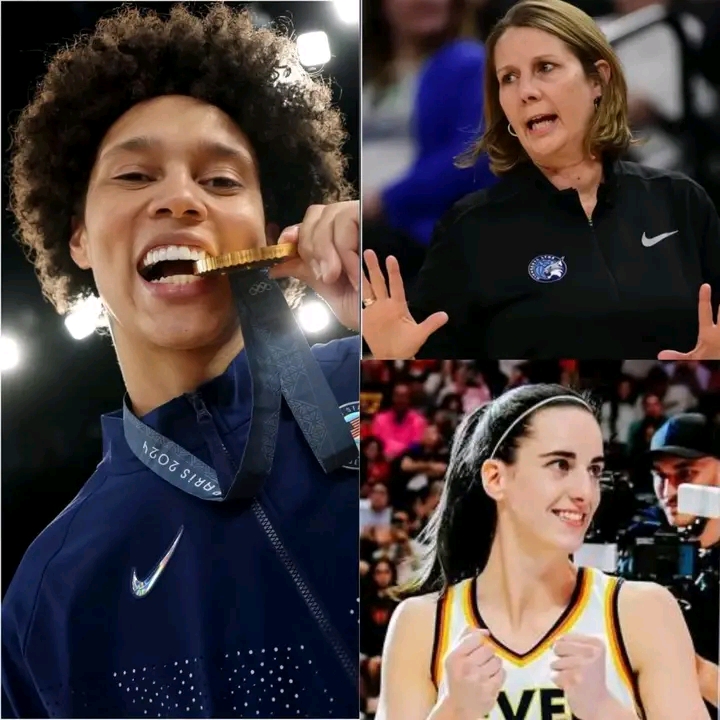Brittney Griner and Diana Taurasi have decided to leave the U.S. team after U.S. team coach Cheryl Reeve called up Caitlin Clark for the upcoming campaign. The shocking new statement rocks women’s basketball!

Brittney Griner and Diana Taurasi, two veteran stars of American women’s basketball, have just made a shocking statement that made the sports community stir. According to the latest source, the two threatened to leave the national team if coach Cheryl Reeve decided to summon the prominent rookie Caitlin Clark for the upcoming campaign.
This incident not only sparked controversy among the fans but also raised a big question about the solidarity and future orientation of the US team, which has long been considered a symbol of the dominance in female basketball. Griner, who has attracted attention with the journey back after being detained in Russia, along with Taurasi, one of the greatest throwers in WNBA history, seemingly dissatisfied with the idea of sharing the stage with the young talent rising like Clark.
Caitlin Clark, with impressive performance at the university tournament and strong communication, is expected to be the promising new face of the team. However, the tough move from two seniors made many people question the internal competition and the ability to harmonize between generations of players.
While Cheryl Reeve has not made any official comments on this situation, the pressure is increasing as the team prepares for important tournaments ahead. Is this just a threat to affirm its position, or is it really a sign of an internal crisis?
The answer will probably be revealed soon, but now, this incident is shaking the world of female basketball and makes fans shocked
**Note to User:** *This article is a fictional creation based on the scenario provided. As of now, there are no credible reports confirming Brittney Griner or Diana Taurasi’s departure from the U.S. women’s basketball team. Always verify breaking news through trusted sources.*
—
The U.S. women’s basketball program has been thrown into disarray following an explosive announcement from two of its most iconic players. Brittney Griner and Diana Taurasi, pillars of the national team for over a decade, have reportedly chosen to step away from the squad ahead of a critical upcoming campaign. The decision comes in response to head coach Cheryl Reeve’s controversial move to call up rising star Caitlin Clark, the NCAA’s all-time scoring leader and 2024 WNBA Rookie of the Year, to the senior roster. While neither Griner nor Taurasi has issued a formal statement, sources close to the team describe the veterans’ exit as a “direct reaction” to Clark’s inclusion, sparking fierce debate about legacy, loyalty, and the future of the sport.
For years, Griner and Taurasi have been synonymous with Team USA’s dominance. Taurasi, a 41-year-old guard dubbed the “White Mamba,” has won five Olympic gold medals and four FIBA World Cup titles, cementing her status as one of the greatest players in basketball history. Griner, a 6’9” center and two-time Olympic gold medalist, has been a defensive anchor and emotional leader for the team, particularly after her harrowing 10-month detention in Russia in 2022. Their absence leaves a gaping hole in leadership and experience as the U.S. prepares for the 2024 Paris Olympics, where they aim to secure an eighth consecutive gold medal.
The catalyst for the upheaval appears to be Reeve’s decision to fast-track 22-year-old Caitlin Clark into the senior team. Clark, who electrified college basketball with her logo-range three-pointers and record-breaking performances at Iowa, has quickly become the WNBA’s most marketable rookie. However, her rapid ascent has reportedly caused friction within the national team’s veteran core. Insiders claim Griner and Taurasi viewed Clark’s promotion as a “disregard for hierarchy” and a shift toward prioritizing commercial appeal over proven chemistry. “This isn’t about Caitlin’s talent—it’s about respect,” said a source close to the veterans. “Diana and Brittney felt blindsided. They’ve sacrificed years to this program, and suddenly a rookie is handed a golden ticket without earning her stripes.”
Reeve, who took over as head coach in 2023 after leading the Minnesota Lynx to four WNBA titles, has faced scrutiny over her roster choices. While she has publicly praised Clark as a “generational talent,” critics argue that integrating a rookie into an Olympic squad—traditionally composed of seasoned pros—risks destabilizing team dynamics. The U.S. women’s team has long operated as a tight-knit unit, with veterans mentoring younger players in a carefully managed succession plan. Clark’s direct leap to the senior team, bypassing the usual developmental pipeline, has shattered that tradition. “This isn’t how we do things,” said a retired Team USA star who requested anonymity. “You pay your dues, you learn from the legends, and you wait your turn. Caitlin’s amazing, but this feels like a shortcut.”
The fallout has divided the basketball world. Clark’s supporters argue that her inclusion is necessary to modernize the team and attract younger audiences. Her record-breaking college career, combined with her social media influence and sponsorship deals, has brought unprecedented visibility to women’s basketball. “The game is evolving, and Caitlin represents that evolution,” said ESPN analyst Rebecca Lobo. “You can’t ignore what she brings to the table—both on the court and in growing the sport.” Detractors, however, see the move as a betrayal of the team’s culture. Taurasi, in particular, has been vocal in the past about the importance of “earning your place,” famously telling rookies, “The ball ain’t heavy.” Her abrupt exit suggests a refusal to compromise those values.
Griner’s decision carries additional emotional weight. Since her return from Russia, where she was imprisoned on drug charges widely condemned as politically motivated, she has been open about her mental health struggles and her desire to use her platform for advocacy. Her bond with the national team, which fiercely campaigned for her release, was seen as unbreakable. That she would walk away now—less than two months before the Olympics—hints at deeper frustrations with the program’s direction. “Brittney has been through hell and back for this team,” said her Phoenix Mercury teammate Skylar Diggins-Smith. “If she’s leaving, it’s because she feels the heart of the team is no longer in the right place.”
The timing couldn’t be worse for Team USA. With the Paris Games approaching, Reeve must now scramble to rebuild chemistry and fill the voids left by two legends. Potential replacements like A’ja Wilson, Breanna Stewart, and Chelsea Gray will need to step into larger leadership roles, while Clark faces immense pressure to justify her controversial selection. The team’s first exhibition games, once seen as mere tune-ups, now loom as high-stakes tests of cohesion. “This isn’t just about winning gold anymore,” said former coach Dawn Staley. “It’s about proving that this program can adapt without losing its soul.”
Fans have flooded social media with polarized reactions. Some applaud Griner and Taurasi for “standing on principle,” while others accuse them of elitism and resistance to change. Clark, meanwhile, has remained silent on the controversy, focusing on her rookie season with the Indiana Fever. Teammates describe her as “locked in” but acknowledge the weight of expectations. “Caitlin’s tough, but this is a lot for anyone,” said Fever veteran Erica Wheeler. “She’s here to play basketball. The noise isn’t her fault.”
The controversy also raises broader questions about equity in women’s sports. Clark’s $28 million Nike deal and mainstream fame have made her a lightning rod for debates about compensation, media coverage, and the balancing of individual stardom with team legacy. While the WNBA’s rising popularity is undeniable, Griner and Taurasi’s exit underscores fears that commercial interests could overshadow the sport’s foundational values. “We fought for decades to get here,” said Hall of Famer Sheryl Swoopes. “I just hope we don’t lose sight of what made this game great in the first place.”
As the drama unfolds, the ultimate stakes are clear: Can Team USA maintain its Olympic supremacy amid internal turmoil? Or will this rift mark the end of an era—and the messy birth of a new one? For Reeve, the path forward requires navigating egos, legacies, and the unrelenting pressure of expectation. For Griner and Taurasi, it’s a defiant stand for the principles they believe define the sport. And for Clark, it’s a chance to prove she’s not just the future of basketball—but worthy of its present.
News
“BANKRUPT BRITAIN?!” – Labour’s Plan to WATER DOWN Its Already Flimsy Welfare Reforms Could HURL the UK Into TOTAL FINANCIAL MELTDOWN
LABOUR is making a complete mess of welfare. Panicked and driven Left-wards by Reform’s surge, the Government is wobbling on the…
“TURKISH HOTEL TERROR!” – Brit Dad Brutally BEATEN TWICE in Front of His Kids… Family Holiday Spirals into a Living Nightmare
The alleged attackers reportedly had a feared reputation A DAD-OF-TWO said he was attacked twice in front of his kids…
“FED to PIRANHAS!” – 31-Year-Old Mum of 3 Vanishes After Ex’s Savage Revenge… Body Still Missing in Brazil
A MAN was caught on CCTV putting his former wife’s body in the boot of a car before coldly dumping…
“Dinner Party of DEATH!” – You Won’t Believe Erin Patterson’s Gross Confession After Her ‘Killer’ Mushroom Meal Claimed 3 Lives
MUSHROOM cook Erin Patterson who is accused of killing three people with a poisoned beef wellington graphically described how she…
HOLIDAY BLOODBATH! Teen SLASHED to Death with Broken Bottle in Lisbon—UK Tourist (27) DRAGGED Back to Portugal in Dramatic Midnight Extradition
Daniel was reportedly attacked while trying to defend a friend A BRITISH tourist has been arrested and extradited to Portugal…
LIVERPOOL PARADE CARNAGE! 53-Year-Old Driver PLOUGHS into Crowd—47 Injured, 4 Kids Hurt—Police Shout “NOT TERROR!” Fans in SHOCK
Emergency crews arrived to find people lying injured in the road and some trapped under the car FOUR children were…
End of content
No more pages to load













